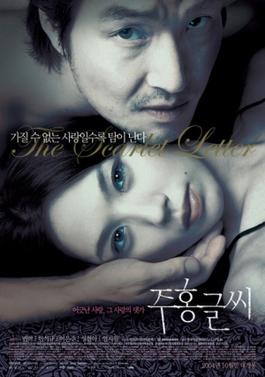Top Qs
Timeline
Chat
Perspective
The Scarlet Letter (2004 film)
2004 South Korean film From Wikipedia, the free encyclopedia
Remove ads
The Scarlet Letter (Hangeul : 주홍글씨, RR : Juhong geulshi) is a 2004 South Korean erotic thriller film about a police detective who investigates a murder case while struggling to hang onto his relationships with his wife and mistress. The film's title is taken from the 1850 novel of the same name. It is the second film by La Femis-graduate and academic Byun Hyuk (Daniel H. Byun) after the Dogme 95 film Interview (2000), and starred Han Suk-kyu, Lee Eun-ju, Sung Hyun-ah and Uhm Ji-won.[1] The film debuted as the closing film of the Pusan International Film Festival in 2004.[2][unreliable source?] The film is based on novelist Kim Young-ha's short stories A Meditation On Mirror and Photo Shop Murder.[3]
Remove ads
The Scarlet Letter was released in October 28, 2004 on South Korea. The film was Lee's last feature-length acting performance before her death in February 2005.
Remove ads
Plot
Lee Ki-hoon is an alpha male homicide detective: intelligent and with animal instincts. His wife, classical cellist Han Soo-hyun, is submissive and seemingly perfect. Meanwhile, he is carrying on a passionate affair with his mistress Choi Ga-hee, a sultry jazz singer at a nightclub. Ki-hoon lives a double life by moving back and forth between these two women, who also happen to be schoolmates from high school. One day Ki-hoon goes to a murder scene and there he meets Ji Kyung-hee, a woman accused of murdering her husband.[4][5]
Remove ads
Cast
- Han Suk-kyu – Lee Ki-hoon
- Lee Eun-ju – Choi Ga-hee
- Uhm Ji-won – Han Soo-hyun
- Sung Hyun-ah – Ji Kyung-hee
- Kim Jin-geun – Jung Myung-sik
- Kim Min-sung – Detective Jo
- Jung In-gi – Detective Ahn
- Choi Kyu-hwan – Detective Choi
- Kim Hye-jin – Oh Yeon-sim
- Do Yong-gu – President Han
- Seol Ji-yoon – Madam
Reception
Summarize
Perspective
Despite Lee Eun-ju's prior experience with depicting sex and nudity in Virgin Stripped Bare by Her Bachelors (2000), she came under the scrutiny of Korean press and netizens, for the highly emotional sex scenes and the notorious "trunk scene" in The Scarlet Letter which is regarded as "one of the most shocking and intense scenes in the history of Korean film."[6] It is speculated her demanding role and its public scrutiny, had compounded and overlapped with an existing variety of family, financial, career, and insomnia issues. Her severe depression ended in suicide in February 2005,[7] and the tragic conclusion has since become the central focus in popular perception and interpretation of the film, this particular one being her last.
Director Kim Ki-duk, no stranger to controversy over his own films, is quoted by Chinese film magazine "Movie Watch" (看電影) in singling out The Scarlet Letter as among the key Korean dramas from recent years. He subsequently cast Sung Hyun-ah, who rose to prominence with her role in The Scarlet Letter, as the heroine in his Time.
At the film's premiere in Japan, veteran actress Kumiko Akiyoshi praised the lead performances and likened the film to a landmark in erotic thrillers after Basic Instinct and Fatal Attraction.[8]
Awards and nominations
- Top Ten Films of the Year
- Nomination – Best Actor – Han Suk-kyu
- Nomination – Best Actress – Lee Eun-ju
- Nomination – Best Supporting Actress – Uhm Ji-won
- Nomination – Best Music – Lee Jae-jin
- Nomination – Best Actress – Lee Eun-ju
- Nomination – Best Actress – Lee Eun-ju
- Nomination – Best Art Direction – Kim Ji-soo
- Nomination – Best Costume Design – Jo Yun-mi
Remove ads
References
External links
Wikiwand - on
Seamless Wikipedia browsing. On steroids.
Remove ads

